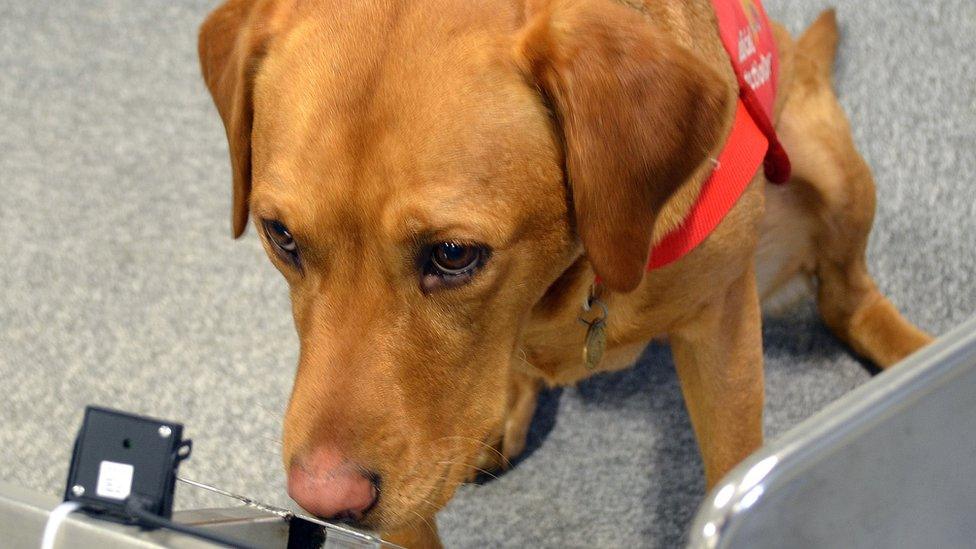'My dog Magic, the lifesaver'
- Published
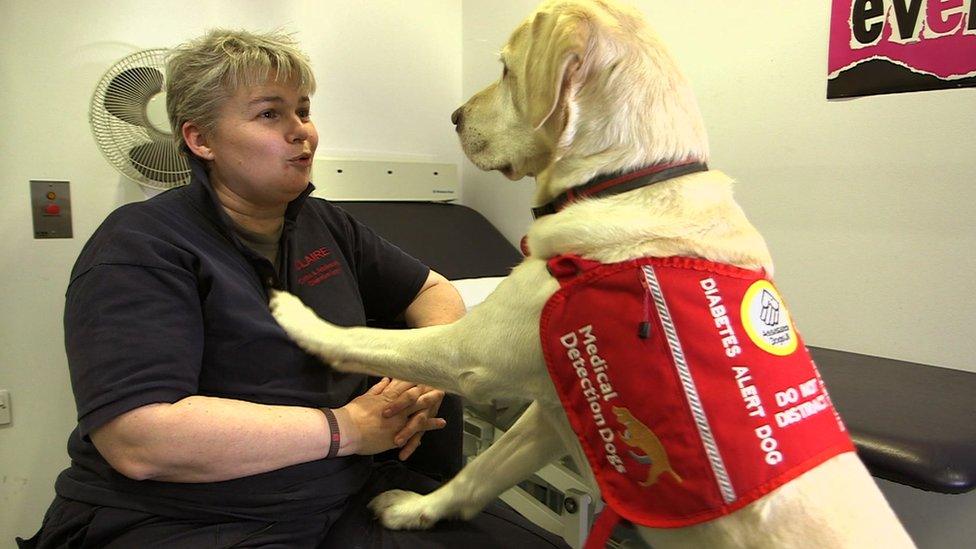
Magic alerts Claire to changes in her blood glucose levels
Dogs are known as man's best friend and their powerful sense of smell means they also have the potential to save lives - detecting changes in blood glucose levels in type 1 diabetes patients and urine samples from those with prostate cancer.
Magic leaps up, placing his paws on his owner's knees, his brown eyes staring into hers.
It is a routine he has done thousands of times.
Magic is a medical alert assistance dog, and has been trained to detect a minute shift in the blood sugar levels of his owner, Claire Pesterfield.
Using his superior sense of smell, he is capable of detecting tiny odour concentrations - around one part per trillion.
Without Magic's assistance, changes in her blood sugar levels could put her at risk of a seizure, or - in extreme cases - the onset of a coma.
Claire has type 1 diabetes, but - unlike most people with the condition - her body does not display the warning signs that a dangerous episode might be about to occur.
"I've used all the latest technology that's out there, and it still doesn't give me enough warning to prevent the episodes, or make them less severe," she tells the BBC's Victoria Derbyshire programme.
"But Magic can give me up to a 30-minute warning that I need to take action.
"In the three and a half years we've been together, he has alerted and potentially saved my life 3,500 times. And he does it all for a dog biscuit.
"I know without him, I wouldn't be alive today."
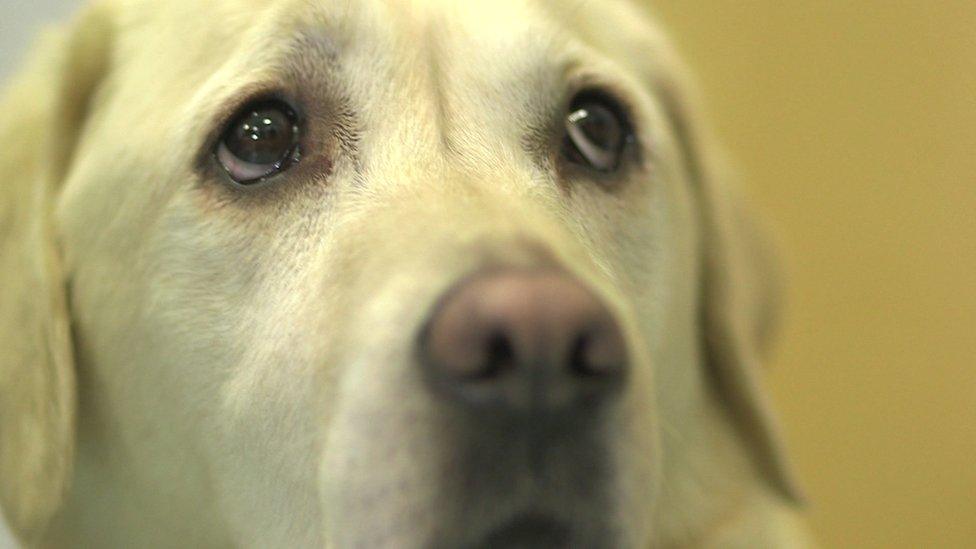
Claire's hero, Magic
Claire works as a children's diabetes nurse, supporting and educating children with type 1 diabetes and their families.
She says she would not be able to do the job were it not for Magic, as she would be at risk of collapsing mid-meeting.
"Without him I would be testing my blood glucose level every 20 or 30 minutes, to try and pre-empt what was going to happen," she explains.
Having Magic also sends the message to the children she works with, she adds, that, "You can still live life to the full when you've got diabetes."
'I was exhausted'
Magic sleeps by Claire's bed each night.
When he detects a change in her blood glucose level, he prods her with his paw to wake her up.
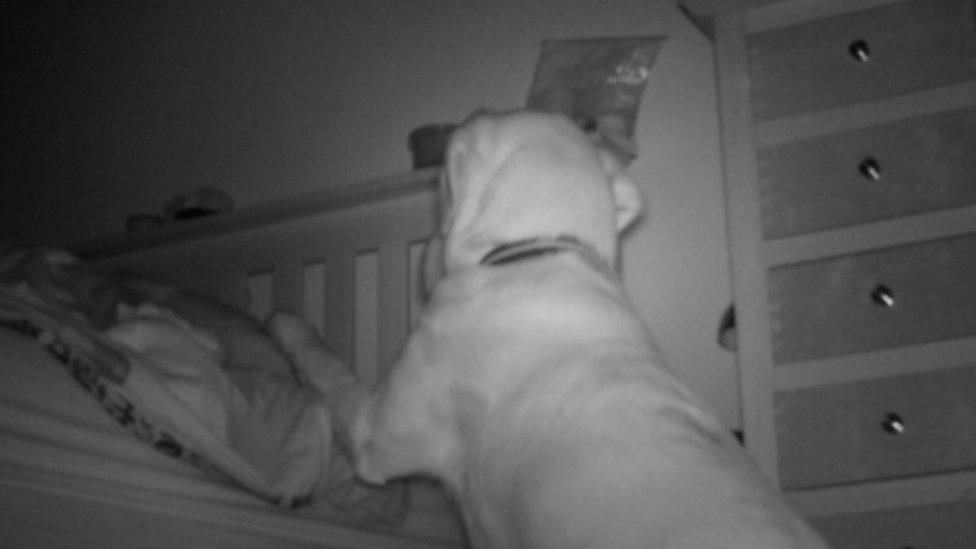
Magic wakes Claire in the night, when she may be at risk of an episode
"Before I got Magic I would be up every hour, trying to check my blood glucose level, trying to predict when these episodes would happen," she explains.
"That meant that I was exhausted. Many a time I would be too afraid to go to sleep in case I had an episode and wouldn't wake up.
"Now I know my husband won't have to worry that when he wakes up in the morning I'm going to be dead next to him.
"Simple things like that are very hard to put into words."
Infected cells
NHS trials are currently assessing if dogs could also be used to detect prostate cancer.
The research being conducted offers an opportunity for the disease to be detected at an early stage - vital for improving survival rates.
The dogs - usually from the gundog breed, such as labradors and springer spaniels - are taught to detect a sample of urine from a patient with prostate cancer.
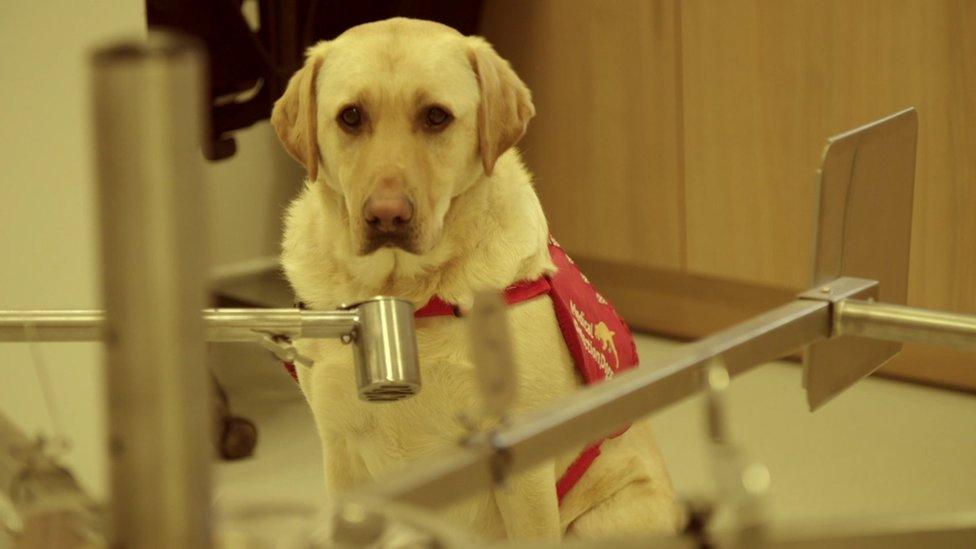
Cancer detection dogs are taught to identify when a urine sample belongs to a prostate cancer patient
It is thought that the dogs can pick up the odour of cancer "volatiles", which travel from the infected cells into the urine as the body tries to dispose of the chemicals.
When they correctly detect a sample containing these volatiles, they are given a treat as positive reinforcement.
The dog's performances are recorded, and those that make the grade have more than a 90% success rate at detecting a sample from a patient with prostate cancer.
'Bio-sensor'
Dr Claire Guest, co-founder of the charity Medical Detection Dogs, realised she had breast cancer after her dog, Daisy, began nudging an area of her chest which felt bruised.
Tests later revealed she had two tumours.
This potentially life-saving experience sparked her interest in the capabilities of detection dogs.
"Although the dog has a fluffy coat and a waggy tail, he is in fact a highly sophisticated bio-sensor," she explains.
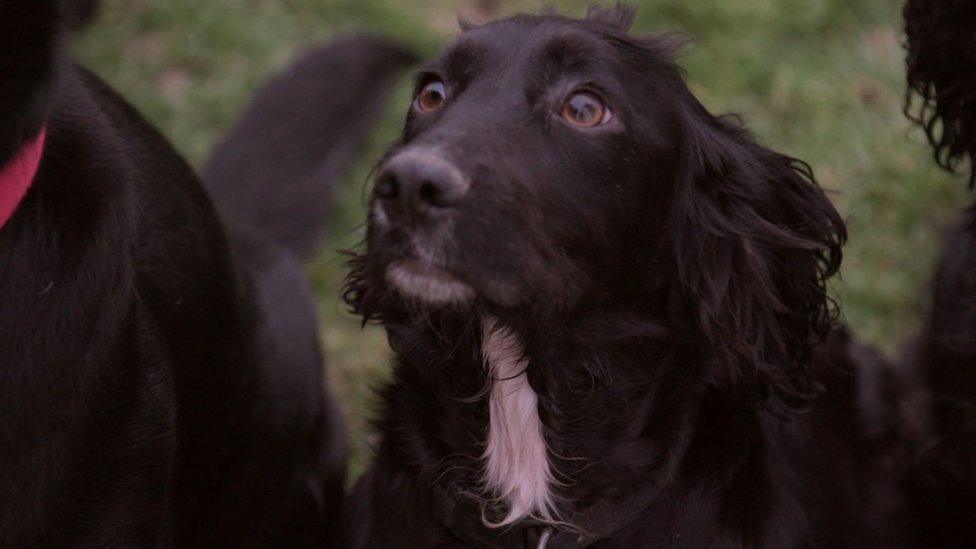
The gundog breeds are most commonly used as cancer detection dogs
"Evolution has given him this highly sensitive nose, going down to parts per trillion. So we're talking about a science here.
"People board planes every day that have been screened by detector dogs to see if there are explosives on board. That's a life-or-death decision.
"Why do we rely on them there but not assisting us with health?"
Currently, cancer detection dogs do not receive any government funding, but Conservative MP Iain Duncan Smith hopes that can change.
He discovered the charity's work through his wife Betsy, who - after having breast cancer - became a trustee at Medical Detection Dogs.
Mr Duncan Smith believes the "pioneering research doesn't just have the potential to save lives, but also to save our NHS many millions of pounds".
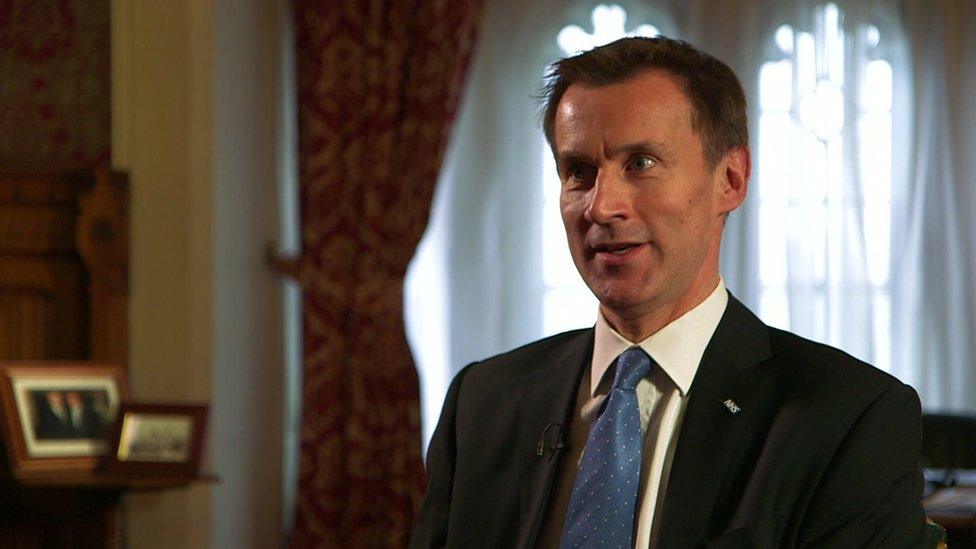
Jeremy Hunt says he will look at the research on cancer detection dogs once published
England's Health Secretary Jeremy Hunt told him he will consider the findings of the NHS trial when published.
"I think ideas like this sometimes don't get looked at as quickly as they should, because they sometimes get put in the quackery box.
"I will personally look at this research when it comes through. One of our jobs as MPs is to question orthodoxies and look at different ways of doing things that possibly the establishment has swept under the carpet.
"If this research is good, I want to know about it."
Watch the Victoria Derbyshire programme on weekdays between 09:00 and 11:00 on BBC Two and the BBC News Channel.
- Published24 September 2015
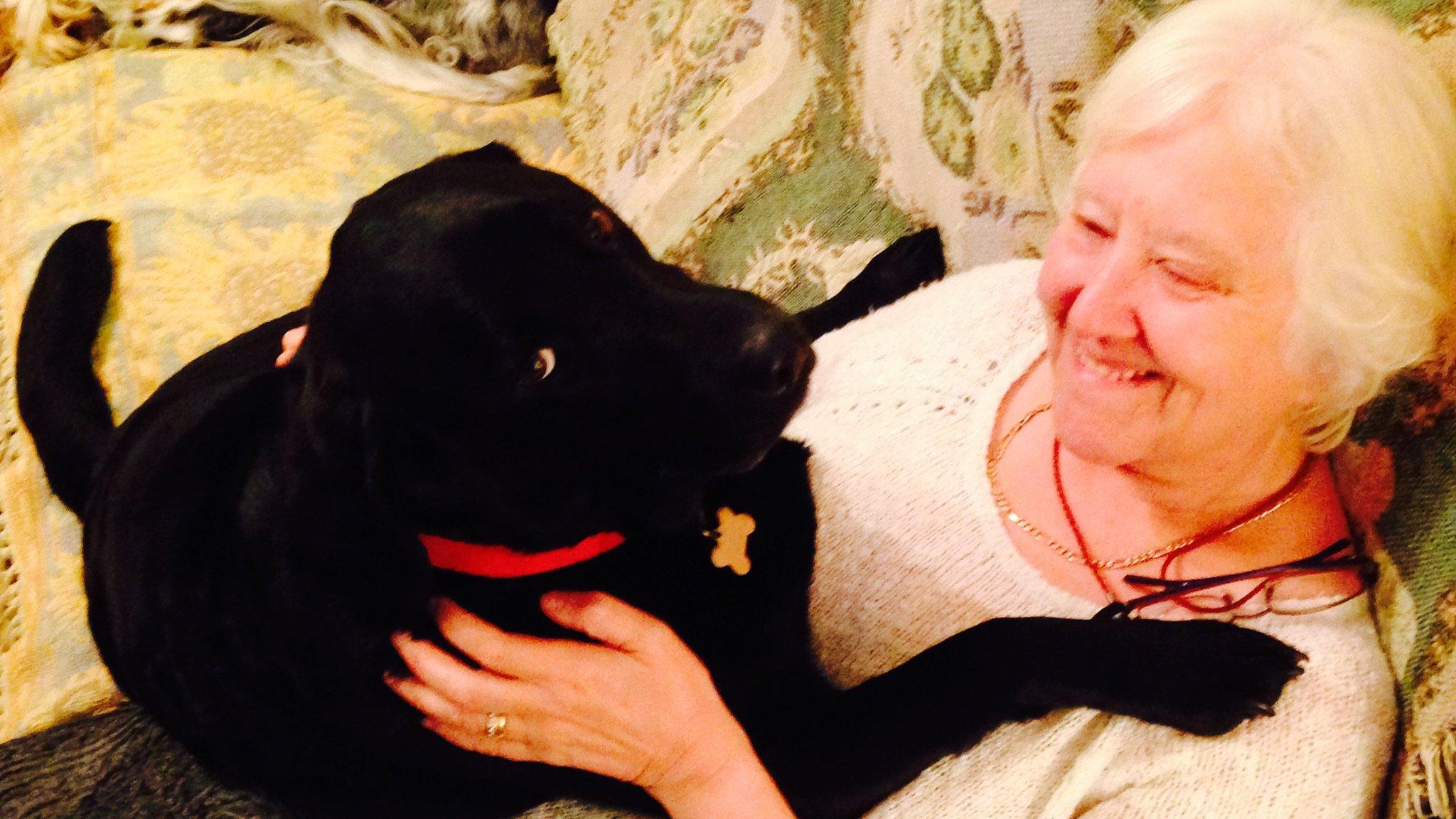
- Published8 August 2015
